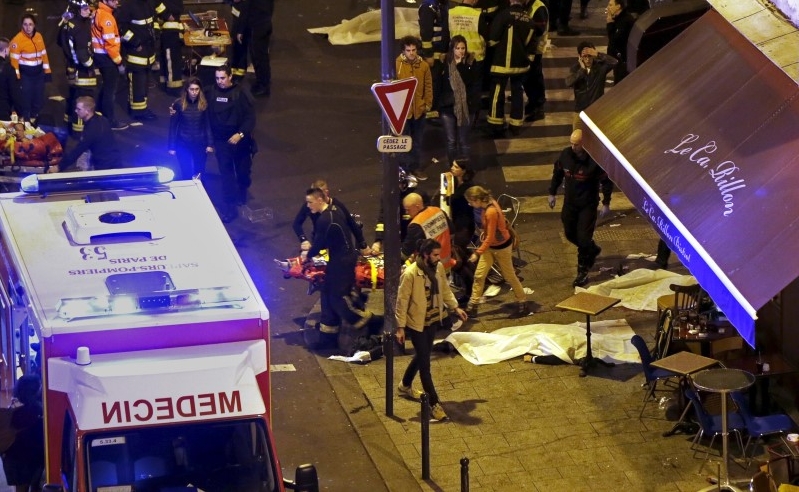
A majority of Americans want the United States to intensify its assault on the Islamic State following the Paris attacks, but most remain opposed to sending troops to Iraq or Syria, where the militant group is based, a Reuters/Ipsos poll found.
That view runs counter to comments by some 2016 Republican presidential candidates like former Florida Governor Jeb Bush, who called on Monday for more U.S. "troops on the ground" in the region. After years of prolonged conflict in Iraq and Afghanistan, Americans appear reluctant to become embroiled in another war even as they push for more action.
The poll - conducted over the weekend after the suicide bomb and shootings in Paris - also found that 63 percent of Americans were fearful that a Paris-style attack could happen near them, suggesting that national security could emerge as a theme in the campaign for the November 2016 presidential election.
Americans are more fearful now than they were in the immediate aftermath of the bombing of the Boston Marathon in 2013, even though the latter took place on U.S. soil, the poll showed. In Friday's attacks, gunmen struck a concert hall, bars, restaurants and a soccer stadium, killing 129 people. [nL8N13B1NP}
The poll of 1,483 people found rising concern about terrorism. Of those polled, 17 percent listed terrorism as their top concern - a rise from 9 percent when asked in October. Terrorism tied with the economy as the top issue.
The results suggest an opening for Republican presidential candidates, who have been looking for ways to attack Democratic front-runner Hillary Clinton's tenure as secretary of state under President Barack Obama. Clinton has argued that her foreign policy experience makes her the best qualified to be the next commander-in-chief, but Republican critics have sought to link her to Obama's Middle East policies, which they say have allowed the Islamic State to metastasize.
Historically, though the economy has remained the top issue for voters even in times of foreign tumult. In 2004, at the height of the Iraq war, terrorism fell behind the economy and "moral values" when voters were asked to name their top issue, according to exit polls. Nineteen percent listed terrorism as their top concern.
Of those who were concerned about terrorism, 86 percent voted for Republican George W. Bush and only 14 percent voted for his Democratic challenger John Kerry, exit polls found.
The new Reuters/Ipsos poll found that 60 percent of Americans think the United States should be doing more to attack Islamic State, also known as ISIS or ISIL. A small majority said they support using airstrikes in Iraq and Syria, but about 65 percent oppose sending special forces to the region, a move that has already been taken by Obama.
When asked about regular ground troops, the opposition grew stronger with 76 percent opposing deploying troops.
Speaking in Turkey on Monday, Obama ruled out the possibility of sending ground troops to fight ISIS.
HAWKISH CANDIDATE COULD BENEFIT
Benjamin Taylor, a political science professor at the Massachusetts College of Liberal Arts who has researched public opinion and war, said it's unsurprising that Americans remain opposed to sending ground troops. Research has found that Americans are only inclined to support such a move when a clear objective has been defined, he said.
Taylor said that if national security remained near the top of voters' concerns in the weeks to come, a more hawkish candidate was likely to win the Republican nomination.
Still, it is too early to say if the ripples generated by the Paris attacks in the 2016 White House race will still be felt in the months to come, analysts said. Voters and the media have notoriously short attention spans.
The poll also found that 52 percent of Americans think nations which accept refugees fleeing the strife in Syria are less safe. A Syrian passport found near the body of one of the Paris attackers showed that its holder passed through Greece in October, raising concern that the attackers had entered Europe amid the wave of refugees fleeing Syria's four-year civil war.
But there was a sharp divide over whether nations should stop accepting refugees, the poll showed. Forty percent said countries should continue to accept refugees because those people are fleeing terrorism. And 41 percent said those countries should stop accepting refugees because of the threat of terrorism.
The U.S. State Department said on Monday it still planned to accept 10,000 Syrian refugees in the next year even as Republican governors in at least 10 states said they would try to block them from their states. Republican presidential candidates Ben Carson and Mike Huckabee called on the U.S. Congress to block the administration from bringing in more refugees.The Reuters/Ipsos poll has a credibility interval of 3 percentage points.





![[Exclusive Interview] A revelation within the brink of life and death — Meg Leung’s mission in Christian art](https://www.gospelherald.com/media/cache/thumbnail/7/21/72163sp_273w_150h_1x_1y.jpg)

